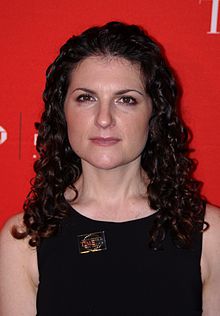Felisa Wolfe-Simon
| Felisa Lauren Wolfe-Simon | |
|---|---|

Wolfe-Simon at the 2011 Time 100 gala
|
|
| Born | Felisa Lauren Wolfe |
| Residence | United States |
| Fields |
Biochemistry Microbiology Astrobiology Geochemistry Geomicrobiology Oceanography |
| Institutions |
Lawrence Berkeley National Laboratory NASA Astrobiology Institute US Geological Survey Rutgers University |
| Alma mater |
Rutgers University Institute of Marine and Coastal Sciences (Ph.D.) Oberlin College (B.A.) Oberlin Conservatory of Music (B.M.) |
| Known for | GFAJ-1 bacterium |
Felisa Wolfe-Simon is an American microbial geobiologist and biogeochemist. In 2010, Wolfe-Simon led a team that discovered GFAJ-1, an extremophile bacterium that they claimed was capable of substituting arsenic for a small percentage of its phosphorus to sustain its growth, thus advancing the remarkable possibility of non-RNA/DNA-based genetics. However, these conclusions were immediately debated and critiqued in correspondence to the original journal of publication, and have since come to be widely disbelieved. In 2012, two reports refuting the most significant aspects of the original results were published in the same journal in which the original findings had been previously published.
Wolfe-Simon did her undergraduate studies at Oberlin College and completed a Bachelor of Arts in Biology and Chemistry and a Bachelor of Music in Oboe Performance and Ethnomusicology at the Oberlin Conservatory of Music. She received her Doctor of Philosophy in oceanography from the Institute of Marine and Coastal Sciences at Rutgers University in 2006 with a dissertation titled The Role and Evolution of Superoxide Dismutases in Algae. Later Wolfe-Simon was a NASA research fellow in residence at the US Geological Survey and a member of the NASA Astrobiology Institute. She is currently at Lawrence Berkeley National Laboratory.
Wolfe-Simon's research focuses on evolutionary microbiology and exotic metabolic pathways. At a conference in 2008 and subsequent 2009 paper, Wolfe-Simon, Paul Davies and Ariel Anbar proposed that arsenate (AsO3−
4) could serve as a substitute for phosphate (PO3−
4) in various forms of biochemistry. According to Paul Davies, Wolfe-Simon was the one who had the "critical insight" that arsenic might be able to substitute for phosphorus. As late as March 2010, she had been hinting of some shadow biosphere results to the press.
...
Wikipedia
